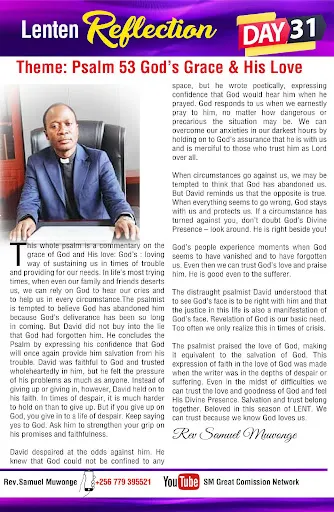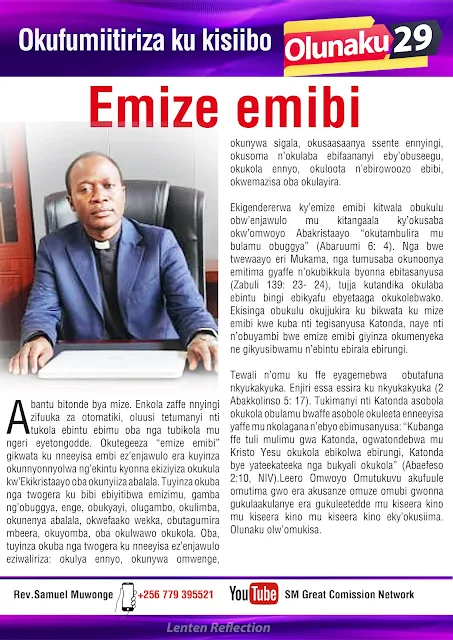Search This Blog
Saturday, April 5, 2025
Lenten Reflection Day 33
Thursday, April 3, 2025
Olunaku lw’okufumiitiriza ku kisiibo 31. Omulamwa: Zabbuli 13.
Zabbuli eno yonna enyonyola ku kisa kya Katonda n'okwagala kwe: Katonda : Engeri ey'okwagala ey'okutuyimirizaawo mu biseera eby'obuzibu n'okutuwa ebyetaago byaffe. Mu biseera ebisinga okugezesebwa mu bulamu, n’ab’omu maka gaffe n’emikwano bwe batugwako, tusobola okwesigama ku Katonda okuwulira emiranga gyaffe n’okutuyamba mu buli mbeera.Omuwandiisi wa Zabbuli akemebwa okukkiriza nti Katonda amusuddewo kubanga okununulibwa kwa Katonda kubadde kuwanvu nnyo mu kujja. Naye Dawudi teyagula mu bulimba Katonda bwe yali amwerabidde. Afundikira Zabbuli ng’alaga obwesige bwe nti Katonda ajja kuddamu okumuwa obulokozi okuva mu buzibu bwe. Dawudi yali mwesigwa eri Katonda era nga yeesiga n’omutima gwe gwonna mu ye, naye yawulira okunyigirizibwa kw’ebizibu bye nga omuntu yenna. Kyokka mu kifo ky’okuwaayo oba okuwaayo, Dawudi yanywerera ku kukkiriza kwe. Mu biseera eby’okuggwaamu essuubi, kizibu nnyo okukwata okusinga okulekulira. Naye bw’owaayo ku Katonda, owaayo obulamu obw’okuggwaamu essuubi. Sigala ng’ogamba nti yee eri Katonda. Musabe anyweeze enkwata yo ku bisuubizo bye n’obwesigwa bwe.
Dawudi yaggwaamu essuubi olw’obuzibu obwali bumuvunaanibwa. Yali akimanyi nti Katonda tayinza kusibirwa mu kifo kyonna, naye yawandiika mu ngeri ey’ekitontome, ng’alaga obwesige nti Katonda yandimuwulidde ng’asaba. Katonda atuddamu nga tumusaba n’obunyiikivu, ne bwe kiba nti embeera eyinza okuba ey’akabi oba ey’akabi etya. Tusobola okuvvuunuka okweraliikirira kwaffe mu ssaawa zaffe ezisinga okuba ez’ekizikiza nga tukwata ku kukakasa kwa Katonda nti ali naffe era wa kisa eri abo abamwesiga nga Mukama ku bonna.
Embeera bwe zitugaana, tuyinza okukemebwa okulowooza nti Katonda atusuddewo. Naye Dawudi atujjukiza nti ekintu ekikontana n’ekyo kituufu. Buli kimu bwe kirabika nga kitambula bubi, Katonda asigala naffe n’atukuuma. Singa embeera ekukyukidde, tobuusabuusa kubeerawo kwa Katonda okw’obwakatonda – tunula okwetooloola. Ali ku mabbali gammwe ddala!
Abantu ba Katonda bafuna ebiseera Katonda bw’alabika ng’abula era n’atwerabira. Ne mu kiseera ekyo tusobola okwesiga okwagala kwa Katonda ne tumuwaana. Ye mulungi wadde eri omulwadde.
Omuyimbi wa Zabbuli eyali atabuse Dawudi yakitegeera nti okulaba amaaso ga Katonda kwe kuba omutuufu naye era nti obwenkanya mu bulamu buno nabwo kwolesebwa kwa maaso ga Katonda. Okubikkulirwa kwa Katonda kye kyetaagisa kyaffe ekikulu. Emirundi mingi nnyo kino tukitegeera mu biseera eby’obuzibu byokka.
Omuwandiisi wa Zabbuli yatendereza okwagala kwa Katonda, n’afuula okwenkanankana n’obulokozi bwa Katonda. Okwolesebwa kuno okw’okukkiriza mu kwagala kwa Katonda kwakolebwa ng’omuwandiisi ali mu buziba bw’okuggwaamu essuubi oba okubonaabona. Ne wakati mu bizibu tusobola okwesiga okwagala n’obulungi bwa Katonda ne tuwulira okubeerawo kwe okw’obwakatonda. Obulokozi n’okwesiga bibeera wamu. Omwagalwa mu sizoni eno ey'Ekisiibo, tusobola okwesiga kubanga tumanyi Katonda atwagala.
Lenten Reflection Day 31
Wednesday, April 2, 2025
Lenten Reflection Day 30
Tuesday, April 1, 2025
LENTEN Reflection day 29. Theme: BAD HABITS
Human beings are creatures of habbit. Many of our practices become automatic, we are sometimes unaware that we do certain things or tjat we do them in a Specific way. The designation “Bad Habits” covers a wide range of negative behavior and could be defined as anything that inhibits Christian growth or offends others. We may be speaking of the so called sins of the spirit, such as envy, jealousy, malice, gossip, lying, criticism of others, selfishness, impatience, quarreling, or procrastination. Or, we may be speaking of various compulsive behaviors: overeating, drinking, smoking, overspending, reading and viewing pornography, excessive working, fantasizing and evil thoughts, masturbation, or swearing.
The object of bad habits assumes special importance in the light of the spiritual demand that Christians “walk in newness of life” (Romans 6: 4). As we surrender to the Lord, asking Him to search our hearts and reveal all that is displeasing to Him (Psalm 139: 23- 24), we will begin to see many ugly things that need to be dealt with. The most important thing to remember with regard to bad habits is that they displease God, but that with His help the bad habits can be broken and replaced with more wholesome alternatives.
None of us is immune to change. The Gospel specializes in change (2 Corinthians 5: 17). We know that God can work our lives in order to bring our conduct into line with what pleases Him: “For we are God’s workmanship, created in Christ Jesus to do good works, which God prepared in advance for us to do” (Ephesians 2:10, NIV).Today may the Holy Spirit search your Heart and find any bad habit developed and cause you to repent of it in this periode of LENT. Blessed day.
Okufumiitiriza ku kisiibo olunaku olwa 29: Emize emibi
Abantu bitonde bya mize. Enkola zaffe nnyingi zifuuka za otomatiki, oluusi tetumanyi nti tukola ebintu ebimu oba nga tubikola mu ngeri eyetongodde. Okutegeeza “emize emibi” gikwata ku nneeyisa embi ez’enjawulo era kuyinza okunnyonnyolwa ng’ekintu kyonna ekiziyiza okukula kw’Ekikristaayo oba okunyiiza abalala. Tuyinza okuba nga twogera ku bibi ebiyitibwa emizimu, gamba ng’obuggya, enge, obukyayi, olugambo, okulimba, okunenya abalala, okwefaako wekka, obutagumira mbeera, okuyomba, oba okulwawo okukola. Oba, tuyinza okuba nga twogera ku nneeyisa ez’enjawulo eziwaliriza: okulya ennyo, okunywa omwenge, okunywa sigala, okusaasaanya ssente ennyingi, okusoma n’okulaba ebifaananyi eby’obuseegu, okukola ennyo, okuloota n’ebirowoozo ebibi, okwemazisa oba okulayira.
Ekigendererwa ky’emize emibi kitwala obukulu obw’enjawulo mu kitangaala ky’okusaba okw’omwoyo Abakristaayo “okutambulira mu bulamu obuggya” (Abaruumi 6: 4). Nga bwe twewaayo eri Mukama, nga tumusaba okunoonya emitima gyaffe n’okubikkula byonna ebitasanyusa (Zabuli 139: 23- 24), tujja kutandika okulaba ebintu bingi ebikyafu ebyetaaga okukolebwako. Ekisinga obukulu okujjukira ku bikwata ku mize emibi kwe kuba nti tegisanyusa Katonda, naye nti n’obuyambi bwe emize emibi giyinza okumenyeka ne gikyusibwamu n’ebintu ebirala ebirungi.
Tewali n’omu ku ffe eyagemebwa obutafuna nkyukakyuka. Enjiri essa essira ku nkyukakyuka (2 Abakkolinso 5: 17). Tukimanyi nti Katonda asobola okukola obulamu bwaffe asobole okuleeta enneeyisa yaffe mu nkolagana n’ebyo ebimusanyusa: “Kubanga ffe tuli mulimu gwa Katonda, ogwatondebwa mu Kristo Yesu okukola ebikolwa ebirungi, Katonda bye yateekateeka nga bukyali okukola” (Abaefeso 2:10, NIV).Leero Omwoyo Omutukuvu akufuule omutima gwo era akusanze omuze omubi gwonna gukulaakulanye era gukuleetedde mu kiseera kino mu kiseera kino mu kiseera kino eky’okusiima. Olunaku olw’omukisa.
Daily Promise
PSALM 37:23-24. 23 The LORD makes firm the steps of the one who delights in him; 24 though he may stumble, he will not fall, for...

-
ministry was accidental or random. From His childhood visit to the temple, to His last words before His ascension, Jesus unders...
-
Rev. Samuel Muwonge preaching to students Kitende S.S. God heals the broken hearted I surrender all to Jesus Student...
-
"Do to others as you would have them do to you." —Luke 6:31 "Therefore, as God's chosen people, holy and dear...



.jpg)
.jpg)




